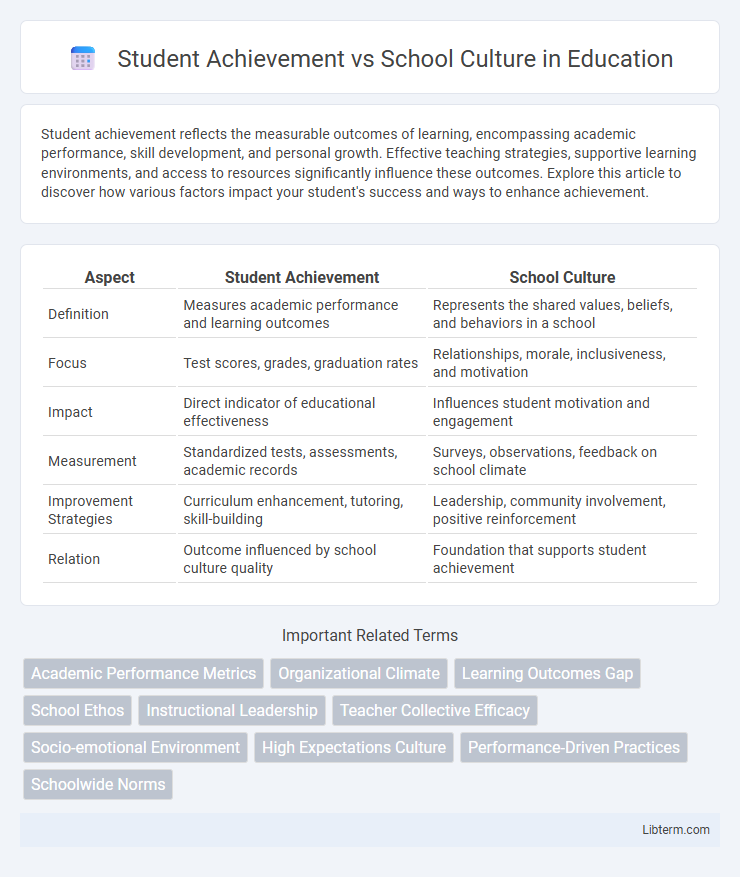Student achievement reflects the measurable outcomes of learning, encompassing academic performance, skill development, and personal growth. Effective teaching strategies, supportive learning environments, and access to resources significantly influence these outcomes. Explore this article to discover how various factors impact your student's success and ways to enhance achievement.
Table of Comparison
| Aspect | Student Achievement | School Culture |
|---|---|---|
| Definition | Measures academic performance and learning outcomes | Represents the shared values, beliefs, and behaviors in a school |
| Focus | Test scores, grades, graduation rates | Relationships, morale, inclusiveness, and motivation |
| Impact | Direct indicator of educational effectiveness | Influences student motivation and engagement |
| Measurement | Standardized tests, assessments, academic records | Surveys, observations, feedback on school climate |
| Improvement Strategies | Curriculum enhancement, tutoring, skill-building | Leadership, community involvement, positive reinforcement |
| Relation | Outcome influenced by school culture quality | Foundation that supports student achievement |
Understanding Student Achievement: Key Metrics and Definitions
Student achievement is commonly measured through standardized test scores, graduation rates, and grade point averages, reflecting academic proficiency and mastery of curriculum standards. School culture encompasses the shared beliefs, values, and attitudes that influence the learning environment and student engagement, directly impacting motivation and performance outcomes. Understanding these key metrics and definitions allows educators to identify strengths and areas for improvement, aligning instructional strategies with a positive, supportive school culture to enhance student success.
Defining School Culture: Values, Norms, and Environment
School culture encompasses the shared values, norms, and environment that shape the behaviors and attitudes of students and staff, directly influencing student achievement. A positive school culture fosters a supportive atmosphere where collaboration, respect, and high expectations drive academic success and personal growth. Research shows that schools with strong, inclusive cultures report higher student engagement, better attendance, and improved test scores.
The Interplay Between School Culture and Academic Outcomes
School culture significantly influences student achievement by shaping attitudes, behaviors, and motivation within the learning environment. Positive school culture fosters collaboration, high expectations, and a supportive atmosphere that enhances academic outcomes. Research shows that schools with strong, cohesive cultures consistently report higher student performance and engagement.
How Positive School Culture Drives Student Success
Positive school culture fosters a supportive environment where students feel valued, motivated, and engaged, directly enhancing academic achievement. Strong relationships among teachers, students, and staff create a collaborative atmosphere that promotes perseverance and high expectations. Schools with positive cultures report higher test scores, improved attendance, and increased graduation rates, demonstrating the critical link between culture and student success.
Barriers to Student Achievement within Different School Cultures
Barriers to student achievement within different school cultures often stem from varying degrees of teacher collaboration, administrative support, and inclusivity practices. Schools with a rigid, hierarchical culture may inhibit open communication, reducing student engagement and motivation. Conversely, cultures promoting trust and shared values tend to foster environments where students overcome socioeconomic and emotional challenges more effectively.
Real-World Examples: High-Achieving Schools with Strong Cultures
High-achieving schools such as Finland's Lahti Lyseo and Japan's Ritsumeikan Uji High School exemplify the link between positive school culture and academic success. These institutions foster collaborative environments, emphasize respect and support, and implement student-centered learning, resulting in consistently high student achievement. Research from the National Center for Education Statistics confirms that schools prioritizing a positive culture see improved test scores, lower dropout rates, and higher college admission rates.
The Role of Teachers and Leaders in Shaping School Culture
Teachers and leaders play a critical role in shaping a positive school culture that directly influences student achievement. Effective educators foster collaborative environments, promote high expectations, and model respectful communication, creating a sense of belonging and motivation among students. Strong leadership drives consistent policies, supports professional development, and establishes a shared vision that aligns school culture with academic success.
Student Engagement: Linking Culture to Performance
Student engagement plays a crucial role in linking school culture to student achievement by fostering an environment where learners feel valued and motivated. Schools with positive, inclusive cultures promote active participation, collaboration, and emotional support, which directly enhance academic performance and reduce dropout rates. Research consistently shows that when students perceive school climate as supportive, their engagement increases, leading to higher test scores and overall school success.
Strategies to Improve School Culture for Better Achievement
Implementing collaborative professional development programs fosters teacher engagement and positively impacts school culture, directly enhancing student achievement. Creating a supportive environment through clear communication, shared values, and recognition systems promotes student motivation and academic success. Integrating social-emotional learning and encouraging student voice cultivates inclusivity, which correlates with improved attendance and higher test scores.
Measuring the Impact: Assessing School Culture and Student Results
Measuring the impact of school culture on student achievement involves analyzing qualitative and quantitative data such as student attendance rates, standardized test scores, and surveys on teacher-student relationships and school climate. Tools like the School Culture Survey and the Organizational Health Inventory provide reliable metrics to assess factors like staff collaboration, leadership effectiveness, and behavioral expectations. Correlating improvements in school culture indicators with gains in academic performance offers a comprehensive understanding of how a positive environment fosters student success.
Student Achievement Infographic

 libterm.com
libterm.com